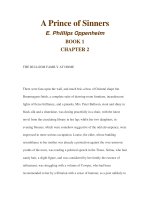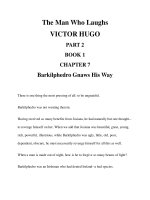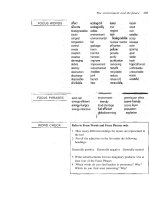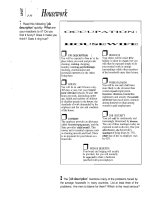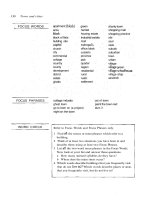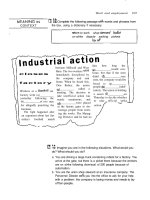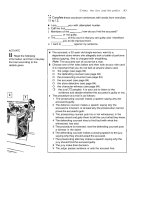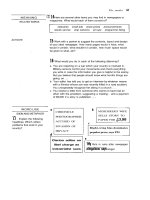more than words book 1 phần 2 pps
Bạn đang xem bản rút gọn của tài liệu. Xem và tải ngay bản đầy đủ của tài liệu tại đây (861.29 KB, 20 trang )
Related and unrelated meanings
SETS OF WORDS
:
rt
^ ;"i^.r:;;:
r
i iil#, ' ;.l'i
Words'
can
>often
'wfs'with
relate
,
togetjief
in
.
related
meanings.
Fur
examp
there arc
many
words
that
are
related
to
'cooking,
swfe
as
fry,,
boil,
saucepan,
knife,
etc.
9 Organize this group of words and
expressions into three different families. Show
your lists to a partner and explain why you
have grouped the words in the way you have.
amusement
patient tests
fall
asleep
joke
neurologist
wake up
sense of humour
bedclothes
dissect
1U
Read the continuation of the text. List
words from the text which have meanings
related to:
a surprise or shock
b dislike
ACTIVATE
11 Ask a partner what she or he thinks
happened or is happening to the young man
in
the text. Think how you would have
felt
in
the young man's situation, and complete these
expressions:
I
would
have
felt
I would have found the
experience-
Then, together, look at the words you have
used, and the words used in the text to
describe the young man's feelings, and try to
organize them in a
table
like this:
Related to:
Fear
Amusement
Surprise
Confusion
-ed
adjectives
e.g. frightened
-ing adjectives
frightening
•
he man who fell
When 1 arrived I found the patient lying on the
floor by his bed and staring at one leg. His
expression contained anger, alarm,
bewilderment and amusement — bewilderment
most of
all,
with a hint of consternation. I asked
him if he would go back to bed, or if he needed
help,
but he seemed upset by these
suggestions
and shook his head. I squatted down beside
him, and took the history on the floor. He had
come in that morning for some tests, he said.
He had no
complaints,
but the neurologists,
feeling he had a
'lazy'
left leg, thought he should
come in. He had felt fine all day, and fallen
asleep towards evening. When he woke up he
felt fine too, until he moved in bed. Then he
found, as he put it,
'someone's
leg'
in the bed
- a severed human
leg,
a horrible thing! He
out of bed (Continued)
was stunned, at first, with amazement and
disgust — he had never experienced, never
imagined,
such an incredible thing. He
felt
the
leg gingerly. It seemed perfectly formed, but
'peculiar'
and cold. At this point he had a
brainwave. He now
realised
what had
happened: it was
all
a joke! A rather monstrous
and improper but very original joke! It was New
Year's
Eve,
and everyone was celebrating.
Obviously, one of the nurses with a macabre
sense of humour had stolen into the Dissecting
Room and nabbed a leg, and slipped it under his
bedclothes as a joke when he was fast asleep.
But when he threw it out of bed, he somehow
came after it - and now it was attached to
him!
Oliver
Sacks
The Man who
Mistook
his
Wife
for a
Hoi
(Picador)
Related and unrelated
meanings
The
author
says
the man
also
felt
angry.
Here are three words meaning angry. Put
them in order from the most angry to the least
angry:
angry furious annoyed
LEAST
MOST
Now organize the words you have put in the
table
tn
exercise
11
in the same way.
ACTIVATE
1J
Use adjectives ending in
-ed
and
-ing,
such-
as exciting and
excited,
and other
adjectives,
to describe how you felt during a very
enjoyable
experience you've had in the last
two years: for
example,
a holiday, or show or
sporting event you went to, a reunion or
party,
a marriage or birth in the family, etc.
14 The author of this text is a doctor. What do
you think he said to the young man after
listening to his story?
z
D
3 Sense relations
GENERAL AND SPECIFIC
www
Iji'JUKiMI!^^
•*•
-;"
-
iw&"p&$$'ffi*ffiii-f&
tif&wd$'cdri$e.related in
meaning
and
be.foTtg
to
the
same
'family',
is more
'general',
in
meaning
than,fhe
:
other($):'
-
J1
In each of the following exchanges the Write these words in the correct columns
words in
italics
belong to the same family. beside each exchange.
Example:
'Would
you
like
some
fruit?'
'Yes,
please. Can I have an
apple?'
a)
'I'll
just
boil
this
pasta.'
'It
doesn't
need
much
cooking,
does
it? It
says
on the packet:
"Put in hot water and simmer for three
minutes".'
b)
'Oh
Mummy! Look at that
bearV
'Oh
yes. I think it's a polar
bear.
They're
lovely
animals.'
c)
'Let's
have
a
drink.
Do you
want
a
lager?'
'No,
thanks.
I
don't
like
beer,'
d)
'I
saw her
walking
to College
yesterday,
strolling
nonchalantly along Park
Street/
'Yes,
she normally
goes
that
way.'
Most general
fruit
More specific
apple
Most
specific
lising'-a.
mixture
of both
general
und
more
specific
words
and
t
xpression*
helps
t&
Jo be dearer
$bout
twtojt
iiv
mtfin
ami
to
wend
repeating
the
same
wwds,
#n/s
waging
what
ibe
say
or
twttt
more
interesting
• -
i*
2 Read this brief news item.
List the words that are used to refer to:
a the person involved
b the vehicle involved
c the damage to the vehicle
ansi
.
which
.
The
of two
io
bense
relations
0
Replace
the words
underlined
in the text
with appropriate words from the box.
20 year-old bank clerk
apologetic Mrs Castro
woman
young man
A customer celebrating his birthday with
friends was suddenly attacked by the
proprietor of the Cossack Restaurant
yesterday. The customer was taken by surprise
when the proprietor broke a plate over his
head. However, the customer agreed to let the
matter drop when the proprietor explained
that she had assaulted htm because she had
mistaken him for another person, who had
thrown a
plateful
of spaghetti at her the night
before.
T
In this text, put words from the lists below
in the appropriate spaces.
cat
Siamese
pet
exhausted animal
mother of six
owner
university professor
animal lover
save
rescued
bring to safety
was
finally
from a
well
in Cambridge after a four-day battle to keep
her alive. The fell down the disused
shaft on Thursday. The , who was
alerted by a neighbour who heard loud
miaows, immediately got to work to try to
_____
his With the help of
friends the began to dig away at
the narrow opening while his children mounted
a round-the-clock vigil, lowering food and milk
to the in a specially adapted bucket
every few hours. It was only after special help
from the fire brigade that
the
. was
finally
able to the
-
-
ACTIVATE
t)
Imagine you want to tell a story about the
following:
a a wild animal
b a criminal
c a building
List two more specific words or
phrases
that
you could use in addition to each of these
general terms when telling the story.
Then make up a very short story and tell it to a
partner.
0
Work with a partner. Think up an imaginary
(or real!) news item suitable for a local paper
to go with one of these headlines. It should be
light'
but
unusual,
and
will
probably
involve
referring to the same people or things in
different ways.
Five-husband
grandmother
marries her
sixth
Sense relations
r
Sometimes
ffte
meaning
relation
betuwn
two
zvord$
is-so
do^e
that they
are.
very nearly
SYNONYMS,'
that is, titey-have nearly
equivalent
meanings
(e.g.big
and
large),
However,
if
'is
rare-tftat
'-fyi&
zvtrrds-or
cxpre$$ions
hade
exactly
the
same
meaning:
nsttnUy
then-
is.'a
difference
of
stifle,
register^
nuance;
usage,
etc.
:
We
\itsc
-the
different
terms
for
a
:
purpo$e
r
for
example
in
order-
to,
avoid
unnecessary,
repitit^n,,
or
ii>
give
-a
different
emphasis.
i Find appropriate synonyms or near
synonyms to complete the following exchanges
as indicated. Do not repeat any of the words
that A uses.
Example: A: What a glorious day!
B:
Yes,
lovely,
isn't it.
a A: You look tired.
B:
Yes,
I'm
A: That film was awful, wasn't it.
B:
Yes,
A: Look at that fool trying to overtake.
B: What !
d A: You must be very pleased with the
result.
B: Yes, I'm .
e A: Did the hurricane damage your garden
badly?
B:
Yes,
it it.
f
A: Wake up! You were dozing off.
B: Sorry, I didn't mean to
__
OPPOSITES AND COUNTERPARTS
Witkin
'families
uf
wards,
it
i$'often
-possible-
to
find
pairs
of
opposites;
Especially
with
"ati'jectives
fe.'g, tvi(le
andJnarrow}*
Fhuiing
pairs like
.this
can
be.
\helpfid
u)hen
trying to remember
vocabulary.
„'
0 Find the opposites or counterparts for the I
words in the box. Then use each pair of words
to describe two people or things.
strong evil ancient patient
decisive broad optimistic
luxurious
impetuous exciting coo!
i"
Here are some expressions involving
opposites. What do they mean?
blow
hot and cold
in black and white
the long and the short of it
off and on
a love-hate relationship
back and forth
Use any three of these expressions in a brief
love story with the title:
Absence makes the heart grow fonder
4
Metaphor,
idioms,
proverbs
'I
Using a dictionary, match the verbs to the
correct pictures. Sometimes more than one
word is possible.
bark cackle
grvnt
bleat
squawk whinny hoot purr roar
L
In
English we say that dogs go
'woof,
woof
and cats go
'miaow,
miaow'.
What sounds do
they make in your language?
Metaphor,
idioms,
proverbs
13
&inrng
Qfthewordsinvysrci&l
can-be
extended 10
apply
to
the
wMJ-that
we
(humans}
speak
react:'-This
ts
an example of
metaphor.
Use some of the verbs to show how the
person in each picture is speaking. Sometimes
more than one answer is
possible.
'Get
your hair
cut/
he
'Hmmph!
The country's going to the
dogs'
she
'Get
out of my house and
don't
come
bacle
/
/
'Another
one for the baskef, she
he-
'Ooh, that's
funny',
she
'B-b-b-u-t
I
d-d-on't
w-want
to',
he
'A
ghost? In my house? Eeeek!' he
'I
like it when you bring me presents',
she
H
Metaphor,
idioms,
proverbs
ACTIVATE
T
Using words from exercises 1 and 3
describe what the
people
do in the following
situations.
a A big man goes downstairs with a shotgun
in the middle of the night and finds a young
thief in the house.
b A
witch
captures a young child and puts him
into the pot.
e Two young people find themselves lost in
the fog in a churchyard in the middle of the
night.
d
A husband and wife are guests at a smart
dinner party, but unfortunately they have a
bit too much to
drink,
e A teacher finds that two of her
pupils
have
let down the tyres of her car, and sees them
trying to run away.
J.
he wind clawed through the shrunken
trees
And
scratched
and bit and roared with rage.
He felt the steam of hot breath on his face
Growling, loose-limbed. He
stood,
lashed
By the sling of its tail as it launched itself
Through
the air away from
him,
ignored,
Towards some other prey. He
sinks.
Now,
to the quiet ground relieved
At the temporary
calm,
suddenly secure.
Peter
Hediey
u
Explain the following metaphors:
a It rained buckets.
b They woke to a carpet of snow over the
land.
e The trees sighed in the breeze.
How do you describe weather in your
language. What common metaphors do you
use?
I
List six words or phrases from the poem
which form part of the extended metaphor.
Sometimes a metaphor is continued for more
than just
one
word or phrase.
0 Read the following poem and answer the
questions.
o
What is
being
described here?
fa What do you think it is being compared to?
Metaphor,
idioms,
proverbs 15
Sometimes metaphors are used so often that
they
become fixed in the language as common
phrase*.
~ or idioms.
0 Look at the comments made by the people in the picture
below. Match the idioms in italics with these sentences.
a Leave things as they are if by mentioning
d
Don't waste time and effort by returning to
them again you are likely to cause an issue which has already been decided.
problems. e It will cause trouble.
b If the punishment is going to be equally bad f The largest part of something.
for both bad and very bad behaviour,
I'll
g He likes teasing people.
behave very badly. h It will distinguish between the good and the
c The information came from somebody with bad.
first-hand
knowledge.
WH$rtjBh'e_
*<rtfs
out
what
he's'6&$k
getting
yp
to that
'
0,-
really.
hor&G
r
S'tn&utty.
so'
';
_
ft must be
true.
He'3;t,e3)ly
greedy.
always
'aiakes
sure he
n's.share.
-'.;-:
W.
Stop
trying'.
chief
Irfs^ector
.fi^es
wv.*i
*
jr V'brtrfc!^
"&
fianged
fora
sh&fyp
terrib
16
Metaphor,
idioms, proverbs
DICTIONARY STUDY
Under which word would you find the
following idioms in a dictionary?
a flog a dead horse
b one may as well be hanged for a sheep as
for a lamb
c play cat and mouse with somebody
d
let sleeping dogs lie
Look in a dictionary. Were you right?
ti
uiioiiis
arc
only
tu\>
words
- often
pairs
of
otyH&ites,
e.g.
high
and
dry,
touch
and
go.
Some
beponie
phrasal
verbs
{see
.
Part A Unit
22)
and
some
are'longer
such
-as the
ones
in
exercise
8,
Generally
the
words
and-
tin- order in
idioms
can
not.be'
changed.
Someone who causes chaos by telling
somebody something about their friend.
Someone who realises they have been
discovered stealing secrets from a
company
and goes on to do something even worse.
Someone who tries to get local residents
involved in a clean-up in the area despite
local
apathy.
Someone who uses the opportunity of one
visit to
complete
at least two overdue tasks.
'All
languages
have
'wise
savings'-at.
:
(
;
;
'[:;c
:
proverbs.
|
These
have became fixed'phrases
'.
even
'though
tehat
they
describe
no.longer'.
_S;j
exists,
e.g
"don't put the
cart
before
the
;
•
:
horse"
(x
don't-do-things
back to front)
=is-
still
used
although
horses
and'carts
are no
,-y
longer
used
in
Britain.
'"
•
:
:
;
Using a dictionary say which of the
following idiomatic expressions in italics are
used correctly and correct those which are
wrong.
a
It
was horrible watching her eat. She made
a real pig of herself.
b Pull up your horses. Don't rush into
this,
c His attitude to women is terrible. He's a real
male chauvinist ox.
d While you're there can you
call
on Miss
Njabella
as well? You may as
well
kill
two
birds with one bullet.
e I'm not surprised they got on so well.
Birds
of a
feather,
you
know
ACTIVATE
11 Use one of the idioms from exercises
8—10
to comment on the following situations.
a Someone who has got a cold because of
the weather.
Using a dictionary or any other source say
what the following proverbs mean.
a A stitch in time saves nine.
b Better the devil you know than the one you
don't.
c Don't put
all
your eggs in one basket.
d Two wrongs
don't
make a right.
e A bird in the hand is worth two in the bush.
f It takes two to tango.
Are there any equivalents
to
these proverbs in
your own language? Translate proverbs from
your own language into
English.
ACTIVATE
Iw
Look for metaphorical use either in your
own language or in English. Look at:
a advertisements b poems c stories
Say what is being described, and as what, as
you did in exercise 6.
5
Collocation
-
which
word
goes
with which?
U
is often important
to.dioose
the
right
word
to
go
with
another
word,
for
example.,
'•can
be
used
to
describe some
nouns
but not
others.
We can say
blonde
woman
or
blond
man
but not
*bl0nde
dog
or
*blonde
horse!
'Blonde'
does
not
collocate
with
dog or
horse
-S
'are
restricted
in similar
i
verbs and objects:
subjects and verbs:
adjectives and
prepositions:
verbs
and
prepositions:
verbs and adverbs:
we drive
a
car but we
can't
*drive
a
motorbike,
the
telephone
rang but not
*the
telephone sounded.
full
of
but not
*full
with
arrive
of but not
*
arrive to
I strongly believe but not
*/
strongly think.
1 Which of these verbs is commonly used with
which
object?
drive
ride
nod
shrug
tell
say
make
do
your shoulders
your homework
a bus
your head
your bed
a lie
this bicycle
a word in
Russian
For each of these verbs, list three direct objects
that can follow them.
2 Which of the combinations of adjectives and
nouns below is unusual? Why? Suggest
improvements
where necessary.
a a fat piece of wood
fa a wrong answer
c a strange coincidence
d a dead apple
e a fat dog
f
a wrong mistake
g a touching letter
h
a heavy drink
I
a touching hand
j a heavy meal
For each of these
adjectives,
list two other
nouns which can follow them.
heavy strong fat
thick
ACTIVATE
With a partner write a description of a very
difficult but memorable imaginary journey
lasting two days. Use the
following
words and
ideas, as well as your own. Be careful to use
appropriate verbs and
adjectives
with these
words:
;
drive tell
say
make
do
car breakdown the middle of nowhere
lift
lorry/truck
driver/drinking
accident
ambulance hospital phone family
disappeared
18
Collocation
- which word
goes
with which?
Which prepositions usually follow these
adjectives?
enthusiastic
different
keen
Inte
doctor
ofrnid
polite
disausted .
thfi
nnme
thf>
hrfinH
WR
eat
learning Spanish
her appointment with the
Inrnfi
Hons
hiit
b^si
himself
ACTIVATE
D
Circle the best
alternatives
in this newspaper
article.
List the words you have selected in the phrases
below:
to_
to
to reduce alcohol
to
a campaign
a disease/epidemic
awareness
it
was agreed
them
Now for each of the
following
prepositions,
list two other
adjectives
that could precede
them:
drinking/smoking
the death/birth — is high
a
rich
about
for
with
of
avoid exposure
a
diet
of fatty foods/sugar
"-¥&
Anti^Cancer
week
backs
.CAMPMONte^^!^^^
tcan.avo^-ned/
\^^^^
.
healthy
f£cK
uav/ivo
»*—
I .
Avoid
over-exposure
of
,
Do not
smoke.
If
you
^
,
under
the
sun
7SXZ&*
'£&&!-
«<•>"
-
trv
r
ii"
1
vvi
people's
company.
7
Reduce
alcoho
istir
sfi*
cereals, and a tamted
>nsu
mption
/
eaimg
-
•-
of fatty
ioods.
Collocation - which word
goes
with which? 19
U
Look at the
list
of recommendations in the ACTIVATE
campaign. Which three would be most difficult Q
,,
,.,
f
.
,
L
Q
t
r
~
,
„
.
iL
.
_,
f
v
Use any of these
tive
words
from
exercise
o
for
you
to
comply
with?
List
mem
in
order
ot
,
,
'
.,
.
.!•«•
ij.
to complete the sentences.
difficulty.
r
/ With a
partner,
work out a similar code for
a
World
Happiness
Week'.
One way to show collocation is on a grid
like
this:
tall
high
person
J
X
tree
y
X
building
y
y
mountain
V
y
fence
v/
/
Complete the grids below in a similar way:
speak
say
tell
a
story
something
in a quiet voice
speak
say
IteU
a lie
French
yes or no
the truth
to// high speak say tell
a The man in the blue jacket
was
the truth when he this
city was popular with tourists.
b Last night Jim his
little
daughter
a
story about a prince who was kidnapped by
a very giant.
c There were only four or five journalists
present, but the Prime Minister in
a very loud
voice,
as if she was addressing
them from a balcony.
d Julia quite good Spanish and
Portuguese.
He never remembers to
and
'thank
you'.
'please'
Think of three adjectives in your own
language
which must be followed by certain
nouns, and two verbs which must be followed
by certain objects. Use a dictionary to find out
whether the collocation rules are the same for
the equivalent words in English.
6 Style and register
1 The two dialogues below have got mixed
up after the first line. Put them in the right
order and then say what the difference
between them is.
Hey. f tove
your
coal!
"
Can
I have
a.'proper
'
-
:
"
;
v
look?
•:
• .
;
"
No, sorry.
'•Wang
on . .•. here
you'ani.
Hand-made, you
know.
If's
my.
sister's,
Nice,
isn't
"
Thanks.
Wow,
it's
great!
U
don't
suppose
you
know.
:
"i
where she
gol
it? •"
'
;:
V
•
"
I'm
sorry
lo
bother
you,
but
do you mind my
asking
where
you bought
that
charming
bag"?
It's
absolutely
exquisite.
Thank you so much for
showing it to me.
Certainly.
As you can
see
rt's hand-made.
Really?
Could
I possibly
have a closer look?
Not at alt. As a
matter
of
fact, it was a present from
a friend in
India.
L Why do you think
people
speak to certain
other people
formally?
Put the numbers 0 (=
not an important
reason),
1,
2 or 3
{=
a very
important reason) beside each of these
possibilities:
a
____
because of the place they are in.
b . because of what they are talking
about.
c because they don't know each other.
d
. because of
their
education and
personality.
other reasons
Style and register 21
Are the following more likely to occur in
formal or informal conversations?
a very polite expressions
like
'Do
you mind
my
. .
/
b
colloquial
expressions like
'hang
on',
'great',
'hey'.
c long complicated words like
'exquisite'.
d omission of subject, e.g.
'(If
s)
Nice, isn't
if.
e special phrases to replace
'yes'
and
'no',
like
'certainly' and
'not
at
all'.
liett
peoph'
are
poking-
or
writing,
%zr
choice'of
words
it?-influenced
partly
by<tlte
weaning
Hey'
ivant
to
get
across,
and.partfy
by
the,?UuatJorrthey
aw
in, tt
may
fa
appropriate
to use an
informal
'-style
fe.g;
withcl<&£
friends),
a
neutral
style
teig.
with
.foismtws
acquaintances),
or ft
formal
s/yfe
(for.ex&mpte,
when-lutiting
a
letter
to a
potential
employer).
ACTIVATE
i
With
a partner, make up two short
conversations, one formal and the other
informal, in which one speaker apologizes to
the other for spilling a drink on their clothes.
5 Look at the three letters. Which do you
consider to be the most
formal,
which the most
informal and which neutral?
22 Style and register
List three reasons why you think one of the
letters is informal, and three reasons why you
think another is
formal.
D
Which of these words and expressions from
the letters is informal
(I),
formal (F) and neither
formal nor informal (N)?
Dear Sir
twice
roll up to work
regular
passenger
to the effect that
the fifth time I've
written
take the biscuit
_.
didn't even bother
I can
tell
you
at your hands
the sorriest victims
cancelled
please suggest
_ bloody trains
maybe
enclosing
just
ended
overpriced
due to
Style and register
ACTIVATE 1
/ Which of the following things make you feel
like complaining? Compare your
answers
with
a partner's.
public transport
restaurants and public eating places
telephones
postal services
the police
television or radio
the health service
something
else
Write a formal letter of complaint in English to
one of these services.
0 With the help of a
dictionary,
try to
complete this table:
Informal/colloquial
dough/dosh
pad
boss
VXXXX
Neutral
policeman
Formal
xxxxx
xxxxx
dwelling
xxxxx
obtain
{is
choosing
more
formal
and informal words
according
Jo
the
-situation*
tftey
a.r$iiT
t
;pea$le
often
use
technical
&r
specialized
language
to
talk
about
a
particular
subject
that
they-know
about
or-are
interested
in.
Fof.exantple,
when
a-doctor
is
talking
to
a
iinrse,Jic.wshf-'iviJl
•H$e'&ffen:nt
tuords
from when to or
she
fr
addressing
a. patient.
/Wtf»y
other
profession?
and
activities,
such
a*
gardening,
music,
computing
and
engineering,*-hav?
therr
otvn
specialized
iwcab&faty.
'
3
Do you use specialized vocabulary in your
own language? If so, where do you use it and
what subjects do you use it for? Discuss your
answers with some other students.
10 Look at the following exchanges. Where
would you expect to hear them, and who
might the speakers be?
In a) ond b), the special language is used
instead of
'normal'
language.
Translate
the
exchanges into
'normal'
non-specialized
English.
lawful
ivedded
husband . • •
Let's lift these floorboards
ever so gently and
take
a look at
the
joists
underneath.
Just
as
I
thought.
There's
quite a
lot of dry rot
here,
ft will
need treating.
What would you
r&commend?
24 Style and
register
Often,
n$
in dialogue? c) and
d}
special
language
is
used'-bectiuse
the
vocabulary is
n&etled
ia'rgfer",
to or
describe
technical
things.
Of course, many people don't
know
the
technical
vocatiutanj,
and
it
•
is
useful to.
be
able
to use
other
equivalent
non-technical
expression.
%&%Js%%&^ ' • ' ' ' •
ACTIVATE
ulllfa
Using
a
dictionary
if
necessary,
find
n
,
,
.
,,
.
.
,
,
.
.,
non-technical ways of saying the following:
Look at the pictures and complete the
'
'
°
a
following descriptions. a They're excavating the ruins.
b Mary's undergoing an appendectomy.
c Dissolve five grams of the powder in the
acid and shake the solution.
d Before
boarding,
extinguish all smoking
materials.
e Season
lightly
and simmer for five minutes.
a vehicle
for
a thing/tool
for
a person
who
a machine for.
a building in
which
Style and
register
25
Look at the diagram below. Explain in
simple English how to put the table together.
7
Parts
of
speech:
verbs
and
nouns
IVt
1
know-
that'
by.chatiging
-the.'
form
of a
.word.
we
-MR
change
its
grtmimatiqtl
'meaning.
iV>r
example
the
adjective
loud can be
reformed
to"
give'
its
loudly fadrerb),
loudncss
(nown),
louder,
loudest,
etc.
In
order
to'know.'
a
word
you
need
to
be
aware
of-the$e
changes
arid
lohai
they.
mean.
To
understand
word formation'
it
can
be
useful
ioknowwhat'theparte
qfs;w
:
cfcfnr
'u
•
are
ctxfied.
' •
•-
'<-'
'
a preposition
b determiner
c noun
d
verb
e adjective
f adverb
g
conjunction
h
phrasal verb
I
pronoun
1 Match the
descriptions
on the left with the terms on the right,
1
words
like
green,
expensive,
uncomfortable,
new,
naughty which
describe a noon or pronoun.
2 words
like
slowly,
very,
tomorrow,
away,
once which add to the
meaning of a verb or an
adjective
or another adverb.
3 words like and,
but,
although,
because which can be used to
join
two
clauses together.
4 Words like
the,
thai,
a,
both,
his which come at the beginning of noun
phrases (e.g. his new hat, the man, both of the old women).
5 words like
notion,
London,
school,
footballer,
happiness,
which are the
names of
people,
places,
things or ideas.
6 verbs like
give
up,
run out of, look
into,
look
after,
which are made up
of two or more words.
7 words like
in,
off, next to,
under,
in spite
of
f
which show how other
words are connected.
8 words like it, them, ourselves, used instead of a noun.
9 words like
be,
walk,
speak,
read,
hide, normally referring to an action
or a state.
2 Read the text. Ignore the brackets which
follow
some of the words. Who do you think
the writer is? Where is he or she, and why?
0 Now
fill
in the
brackets using
the
correct
part of the speech from the list below. You
can use each letter more than once.
V - verb
N — noun
D - determiner
C -
conjunction
P
=
preposition
Adv - adverb
Adj
=
adjective
I hid ( ) in a ( ) half-finished building (
It
was made
of
red ( ) brick ( ) but
hac
no roof. Trees and ( ) grass as high ( )
a-
the
walls of the house had grown inside {
I
went
in through ( ) a window frame so
^
not to leave ( ) any marks around ( ) the
door, and hid fearfully ( ) in
the
grass. 1
tried to keep quiet ( ). 1 tried not to
think
of ( ) the snakes that were probably (
all around me.

